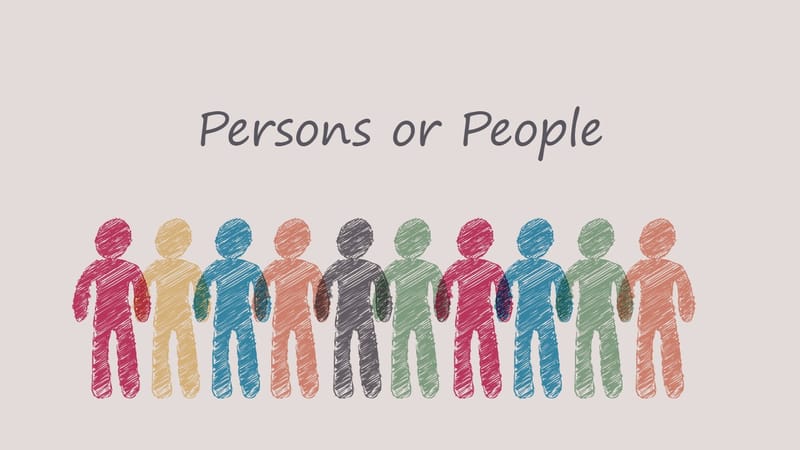From Individuals to Collectives: Exploring 'Persons' and 'People
Contents

Chances are you've found yourself in a dilemma when it comes to using 'persons' and 'people' correctly. You're not alone - this is a common confusion among non-native English speakers in India. But why is it important to know the difference? Improving your understanding of these seemingly similar words can help enhance your overall communication skills, enabling more precise and effective expression.
Through the course of this blog post, we aim to decode the difference between 'persons' vs 'people'. We'll delve into the correct contexts for each term, provide practical examples, and equip you with actionable tips to use them accurately. Let's dive in!
What's The Difference Between Persons Vs People?
While ‘persons’ and ‘people’ seem similar, their usage differs in contemporary English. 'People' is generally preferred in informal and most formal contexts as the plural of 'person', used when referring to a group collectively. On the other hand, 'persons' is used more formally and specifically, usually in legal or official contexts when individuals are being separately considered.
Term | Usage | Example |
People | Used to refer to more than one person collectively, typically in informal and general formal contexts. | "The people of India love cricket." |
Persons | Used when referring to individuals separately or individually, often in legal contexts. | "Persons found littering will be fined." |
When to Use 'Persons' and 'People'?
Let's understand when to use 'persons' or 'people' with some practical examples:
Use of 'People': It's the most widely used term to refer to more than one person. For instance, "The people in my neighbourhood are very friendly". Here, we are referring to a collective group.
Use of 'Persons': This is typically used in legal contexts or formal writings when referring to individuals within a larger group. For instance, "The elevator is suitable for 12 persons". Here, each individual's identity matters.
Common Errors in Using ‘Persons’ and ‘People’

Here are three common mistakes non-native English speakers make when using these terms:
1. Interchanging the Terms:
Many learners assume that since 'person' and 'people' both refer to human beings, they can be used interchangeably. But that's not correct. Example: Incorrect - "There were five persons in the room." Correct - "There were five people in the room."
2. Using 'Persons' in Informal Speech:
The term 'persons' is typically used in legal documents, formal reports, or official notices and sounds awkward in casual conversation. Example: Incorrect - "I met some interesting persons at the party." Correct - "I met some interesting people at the party."
3. Ignoring Contextual Usage:
In some situations, 'persons' might be used to emphasize individuality within a group, while 'people' generally refers to a group as a whole. This subtle distinction is often overlooked. Example: Incorrect (if emphasizing individuality) - “The team consists of five people with unique skills.” Correct - “The team consists of five persons with unique skills.”
How To Correct These Mistakes?
Here's a step-by-step approach to rectify this common mistakes:
Step 1: Recognise the Error
This initial step involves being aware of the mistake. For example, in a conversation between a student and a tutor:
Student: "There were 25 persons in the conference."
Tutor: "Actually, we should say 'people' instead of 'persons'. Let's correct that."
Step 2: Understand The Rule
Remember, ‘people’ is generally preferred when talking about an unspecified number or collective group. ‘Persons’ is used in formal or legal contexts.
Step 3: Consistent Practice
Keep using 'people' in sentences where you're referring to more than one person until it becomes your second nature.
Test Your Understanding
Let's see how well you've grasped the distinctions between 'persons' and 'people'. Try answering these questions:
Which term is more commonly used in everyday English – ‘Persons’ or ‘People’?
Can ‘Persons’ be used in legal contexts? Yes/No
Is it correct to say, "There are many persons in this room"? Yes/No
Check your answers: 1. People; 2. Yes; 3. No
How Can Clapingo Help?
When it comes to understanding the nuanced distinction between 'persons' and 'people', Clapingo’s one-on-one coaching sessions can be a game-changer. Our native English-speaking coaches can guide you through these tricky terrains of language and help you grasp such subtleties effortlessly. You get personalised attention and the chance to clarify all your doubts in real-time.
So, whether you're a student looking to ace English exams or a professional aiming to communicate effectively at work, Clapingo's personalised programme is designed keeping YOU in mind.
A Quick Recap
Let's summarise our key takeaways about the usage of 'Persons' vs 'People'.
Firstly, while both 'Persons' and 'People' refer to more than one individual, their usage is context-specific. 'People' is generally used in informal settings or to refer to a large group with shared characteristics. On the other hand, 'persons' is typically used in legal or formal contexts and when referring to a specific number of individuals.
Secondly, remember that consistent practice is crucial for mastering English conversation. Try using these words in your daily conversations and observe how others use them.
Lastly, understanding these subtle nuances can significantly enhance your communication skills, enabling you to express yourself accurately and confidently.
We at Clapingo are here to guide you every step of the way in your English language journey. Our personalised coaching sessions provide targeted assistance, helping you overcome language barriers effortlessly. Book your instant demo now!
FAQs
1. What is the difference between 'persons' and 'people'?
'Persons' and 'people' both refer to more than one individual. However, their usage varies. 'People' is the regular plural of 'person', used in general contexts. For instance, "Many people visit the Taj Mahal every year." On the other hand, 'persons' is used in a formal or legal context. For example, "The elevator has a capacity limit of 10 persons."
2. Can I use 'persons' instead of 'people' in everyday conversation?
While technically correct, it's generally not common to use 'persons' in casual conversation or non-formal writing. Using 'people' sounds more natural and is widely accepted. Think of it like saying "Could I have a cup of tea?" instead of "Could I be given a cup of tea?"
3. Are there any exceptions to these rules?
Yes, language is flexible and evolving! While these are standard rules, you might sometimes see deviations in literature or creative writing where writers experiment with language for dramatic effect.
Comments
Your comment has been submitted